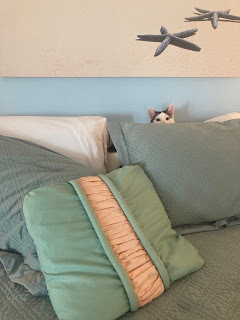Sandra Beasley's Blog
October 7, 2024
Goldilocks, and Beyond
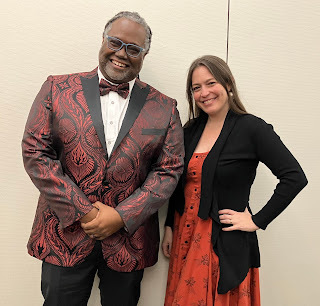
First, I just want to think through the beautiful literary events that I've attended in 2024. I wrapped up my residency at the University of Nebraska Omaha (held at the Lied Lodge about an hour away from Omaha, in Nebraska City) by hearing readings and craft lectures from graduating students, who are champions on and off the page. I got to pose stylishly with the amazing fiction writer and fellow teacher Andy Johnson (pictured here). I only had one student for the spring 2024 semester—by choice, because things were so busy—but that was enough to keep me busy, because she is a mature and talented memoirist with a BIG story to tell.
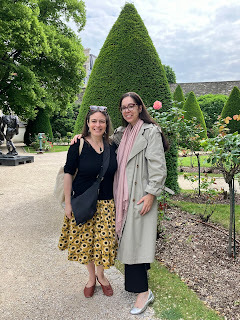 I heard Eduardo C. Corral read at the Arts Club of Washington and we went out for snacks afterward, which gave me a chance to meet poet Simon Shieh. I got to talk with Kyle Dargan at the Hill Center (the video here). Did a Barrelhouse Conversations & Connections thingamajig that gave me ample opportunity to cite a formational influence, the animated movie The Brave Little Toaster. Read alongside former students at the Writer's Club. I heard graduating American University students at Politics & Prose. I toured the Museum Rodin with poet Heather Hartley (pictured here; part of a Paris vacation, but totally counts!). I took part in Hood College's inaugural residency launch of their low-residency program, which included introducing Taylor Johnson for a Juneteenth celebration reading. I attended a Monday night BBP open mic/slam hosted by Angelique Palmer. I went to the National Book Festival and heard poets including Patricia Smith, Traci Brimhall, Forrest Gander, and Ruben Quesada, which was amazing, though a stage devoted to showcasing poet laureates from across the country is a bittersweet reminder that DC no longer has one. I popped back by the Arts Club to hear Bob Hicok read, attended PEN/Faulkner's annual garden party at the Hill Center, and got to grab a brief visit to the Literary Hill Bookfest.
I heard Eduardo C. Corral read at the Arts Club of Washington and we went out for snacks afterward, which gave me a chance to meet poet Simon Shieh. I got to talk with Kyle Dargan at the Hill Center (the video here). Did a Barrelhouse Conversations & Connections thingamajig that gave me ample opportunity to cite a formational influence, the animated movie The Brave Little Toaster. Read alongside former students at the Writer's Club. I heard graduating American University students at Politics & Prose. I toured the Museum Rodin with poet Heather Hartley (pictured here; part of a Paris vacation, but totally counts!). I took part in Hood College's inaugural residency launch of their low-residency program, which included introducing Taylor Johnson for a Juneteenth celebration reading. I attended a Monday night BBP open mic/slam hosted by Angelique Palmer. I went to the National Book Festival and heard poets including Patricia Smith, Traci Brimhall, Forrest Gander, and Ruben Quesada, which was amazing, though a stage devoted to showcasing poet laureates from across the country is a bittersweet reminder that DC no longer has one. I popped back by the Arts Club to hear Bob Hicok read, attended PEN/Faulkner's annual garden party at the Hill Center, and got to grab a brief visit to the Literary Hill Bookfest.Did you notice the part where we were in Paris? Paris! We lived in a 6th-fl apartment near the Bastille for 10 days, and we did a lot of cooking with food bought from the market, and we went out for music—jazz at Le Duc des Lombards and 38 Riv, cabaret at Au Lapin Agile.
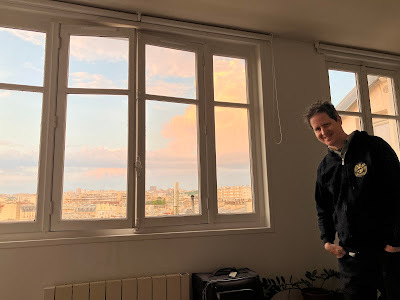
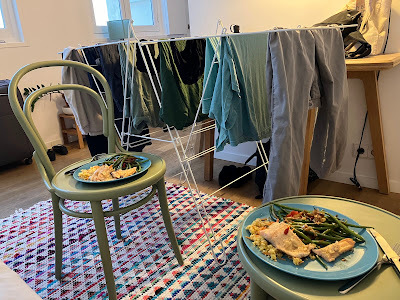
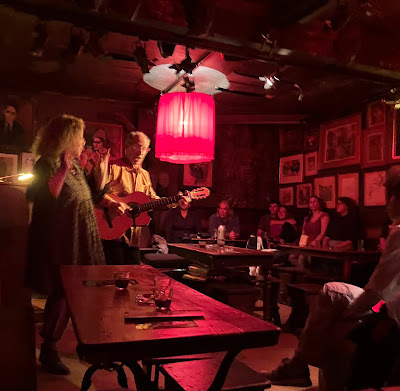
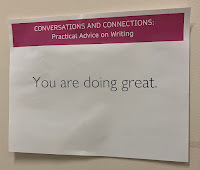
I started this blog post almost two months ago. I've always admired people who can write dispatches from life when it's moving at high speed, and for that matter, I've always admired diarists. That's never been my way. I can move and think fast, but I write slow when it comes to my personal creative work. In less than 24 months, I have had to try on several lives for size. One was too small; one was too big. The good news is that I'm working at a nonprofit that feels humane and sustainable, with room to grow, and the skills I've used in teaching for much of the last decade are also a great match for being a director of communications. But still, it's a lot of change! Bruce Feiler is just one of the thought leaders in talking about "lifequakes," and his work has helped distill what I've been processing. And will need to keep processing.
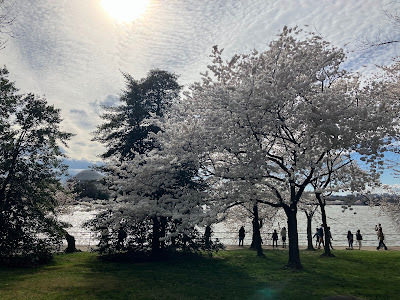
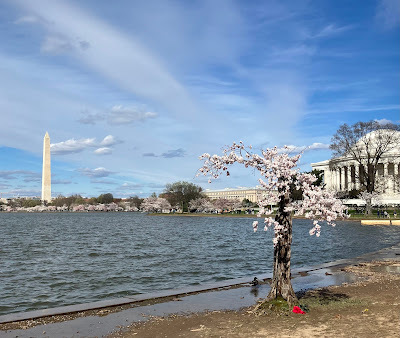
In the spring, I stole two hours from a weekday afternoon and walked along the length of the Tidal Basin during the last stretch of cherry blossom season. I loved watching the people, and the light as it shifted, and I gave a respectful nod to Stumpy. I felt, as I often have in the last few years, the anticipatory grief of knowing we wouldn't be able to afford to stay here forever because our rental apartment would be priced out from under us. No matter how much I loved this part of the city. And I thought, But what if? What if we found a way to stay in Southwest? What if I just dared to let myself make that the goal?
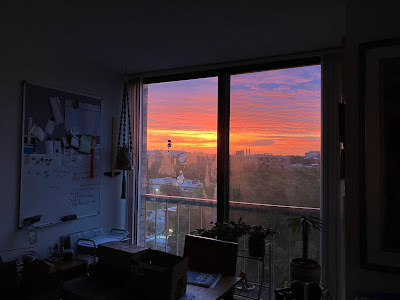
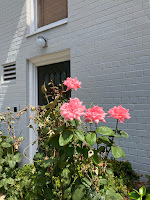
That's how we ended up saying goodbye to an apartment that I loved very much—and oh, I miss the balcony and sunrises—an apartment that took good care of us for more than five years, through the worst of the pandemic. But it's the beginning of the story of a slightly bigger new space, one big enough to host Thanksgiving dinners, one with a spare sleeping space that I can offer a visiting writer, and a ground floor studio that my husband is shaping into a place to make art. Also, a front door! Of the five addresses I've had in D.C., I always had to pass through multiple doors and across multiple floors. Now we're just here, so very close to the larger world and a rose bush that I'm pretty sure is mine to look after, even though I know zilch about tending roses.
In 2021, I bought a quilt made by a Mississippi friend (Coulter Fussell), inspired by the way the red starburst echoed the cover art of Made to Explode. Then it stayed in a box for three years, because I didn't have the space to hang it anywhere. Now I do.
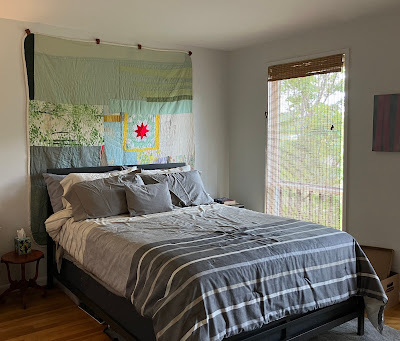
A couple of October opportunities: I'm so excited to join Eileen Weeren, Melissa Scholes Young, and the legendary Kathy Fish as part of the "Stories in a Flash" residential retreat in Charles Town, West Virginia, from October 21 through October 25. Please consider joining us if you can! The full details can be found here, and I'm happy to answer questions. Participants are capped at twelve, and there are only three spots left.
On the afternoon of Thursday, 10/24, I'll lead a two-hour generative workshop—something new that I've developed for this gathering—on "Cultivating the Poetry in Your Flash Prose." I'll be working with flash prose pieces by these ten writers to talk about musicality and the importance of speeding up, slowing down, and introducing rests in your work:
• Talea Anderson• Tyrese L. Coleman• Patricia Coral• Lucy Corin• Nels P. Highberg• Davon Loeb• Jono Naito• Ed Park• George Saunders• Sejal Shah
Right on the heels of that, on Sunday, 10/27 (3-5 PM ET), I'll lead a Zoom-based, recorded Spotlight session for Politics & Prose on Sylvia Plath's Ariel, as part of their series on "The Book That Made Me the Writer I Am." Registration is open now.
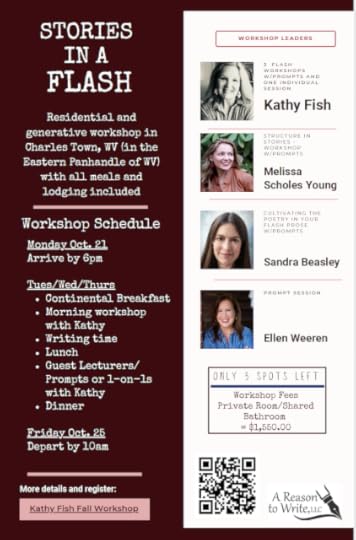
August 15, 2023
Home Again, Home Again

Got back from Pennsylvania a week ago, where I visited with the WCSU MFA program to read from Made to Explode, which won last year's Housatonic Book Award in poetry, teach a seminar on sestinas and golden shovels, and take part in a panel on publishing. We were hosted at the Highlights Foundation retreat, at the base of the Poconos, which was gorgeous (and brought back memories of searching the "Hidden Pictures" feature in magazines kept in my allergist's waiting room). Readings! Fireside nights! Bagpipes! Karaoke! So many wildflowers! So many bunnies!



Just got back from Nebraska a week before that. Had a precious two weeks at home between North Carolina and Nebraska. Took a train to New York City on Monday, so on Tuesday evening.
I'm a little surprised I never titled a blog post "Home Again, Home Again" until now. I did title one "Jiggedy-Jig" on October 1, 2006. That was a short, Millay-Colony-aftermath update that included a prescient announcement: New manuscript title: "Theories of Falling"...
As I type that, I feel both the nostalgic wave of joy that I got my first collection published at all, and then one of sadness that New Issues Poetry & Prose—which gave a start to so many poets, including Jericho Brown and Chet'la Sebree—was recently shuttered by the university that should have protected it. I have to link to the , because that's the last place one can easily survey the incredible back catalogue. You should grab copies while you can! The future of that distribution relationship is TBD once October 2023 is behind us. The New Issues website is down, perhaps for good, since there’s no longer staff to follow up on getting the URL registration renewed. Ooof. This is such a harrowing time for university presses and MFA programs on an infrastructure level, which is in such sharp contrast the vitality of these programs in person.
People still sometimes find “Chicks Dig Poetry” through a particular archived post, or because someone mentions it while using an old bio note to introduce me at an event. I don't plan on ever retiring the blog entirely unless (until) technology forces my hand, even if it survives simply as one or two posts a year. Everyone should have a place to speak freely on the internet, and recent months have made it clear that Facebook, Twitter/X, and other social media platforms are only “free” up until it is the whim of their owners to dictate otherwise. That surely applies to this place too—I notice that one of my posts has been flagged for “sensitive” content, though I can’t tell which one. But for now, I’ll treat it as the closest I have to a soapbox in the public square. (For timely updates, you can always check www.SandraBeasley.com.)
On a practical level, here’s what has happened since I last checked in: I started three jobs in the space of six months. I don't recommend that pacing for the sake of work-life balance, but it was worth it. I’m putting in more hours with Maestro Group, finding that I enjoy consulting on messaging and other projects beyond writing blog posts on inter-office communication styles.
I also began a faculty affiliation with the University of Nebraska Omaha’s low-residency MFA program, which takes me to the Lied Lodge in Nebraska City twice a year. (Although not as glamorous a setting as the University of Tampa, where I taught until the program’s closure in 2020, this MFA program doesn’t run the risk of losing students to the temptations of Ybor City.) In July, I watched my first thesis student give his graduating presentations.

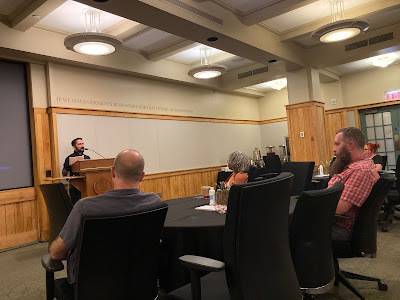
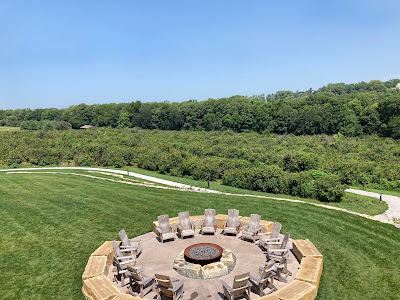
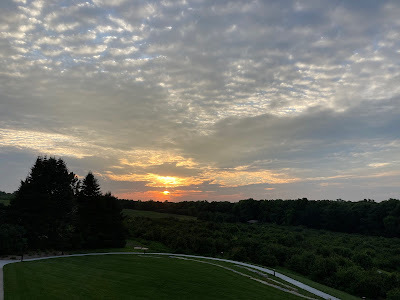
In spring 2023, I also made good on a commitment inked two years ago, by serving as the McGee Visiting Professor of Creative Writing at Davidson College in North Carolina. I came very close to enrolling at Davidson way back when, so this opportunity meant a lot to me on many levels. The roster of McGee professors past is serious business—the program was established in 1988—and includes Dorothy Allison, Henri Cole, Maxin Kumin, Thomas Mallon, D.A. Powell, Therese Svoboda and Kazim Ali. When I was offered the position at the height of the pandemic, it felt like a pipe dream, and then last year's medical crisis threw things into doubt all over again. But we made it happen somehow.
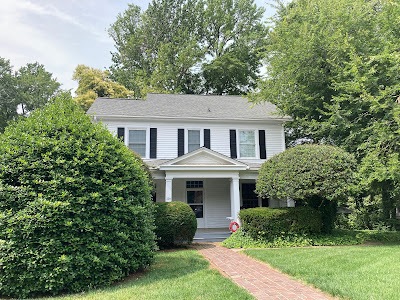
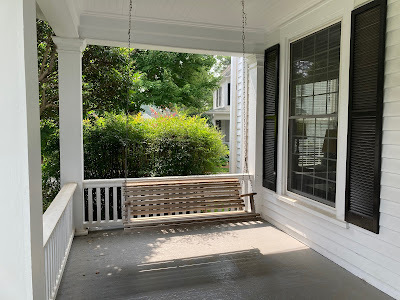
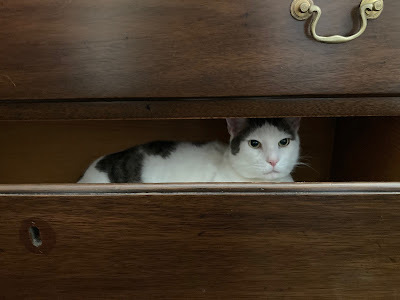
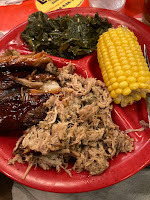 Fortunately, the college loaned us a place to stay—the bottom level of a house just across the street from campus—that made it possible to feel “at home” while still maintaining our beloved apartment in Southwest Washington, DC, and with fairly frequent 6-hour drives between the two addresses. Sal the Wonder Cat promptly investigated the nooks, crannies, and drawers of the new place. I got to teach a 200-level Introduction to Poetry class and a 300-level Creative Nonfiction class. Both met seminar-style, Tuesday and Wednesday afternoons, plus Thursday office hours. I became a regular at one of the bars on Main Street, where I'd sit reading or working on the proposal for the next book. Davidson professor, author, and cartoonist Alan Michael Parker made sure I got to a Wildcats basketball game and ate Lancaster’s BBQ, while I found my own way to good music in Cornelius and readings hosted by Charlotte Lit that included Gaby Calvocoressi and Melissa Febos.
Fortunately, the college loaned us a place to stay—the bottom level of a house just across the street from campus—that made it possible to feel “at home” while still maintaining our beloved apartment in Southwest Washington, DC, and with fairly frequent 6-hour drives between the two addresses. Sal the Wonder Cat promptly investigated the nooks, crannies, and drawers of the new place. I got to teach a 200-level Introduction to Poetry class and a 300-level Creative Nonfiction class. Both met seminar-style, Tuesday and Wednesday afternoons, plus Thursday office hours. I became a regular at one of the bars on Main Street, where I'd sit reading or working on the proposal for the next book. Davidson professor, author, and cartoonist Alan Michael Parker made sure I got to a Wildcats basketball game and ate Lancaster’s BBQ, while I found my own way to good music in Cornelius and readings hosted by Charlotte Lit that included Gaby Calvocoressi and Melissa Febos.
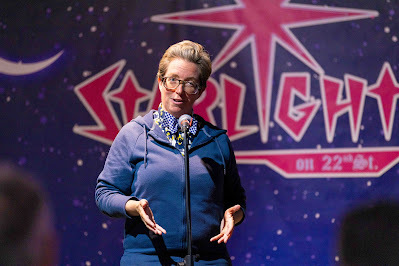
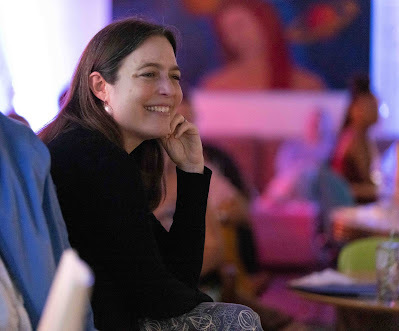
My husband restarted his artistic practice thanks to an affiliation with the McColl Center, and I sometimes joined him for Tuesday evening figure drawing sessions led by artist Felicia van Bork, who happens to also be married to AMP. Old friends from grad school and even high school days (!), plus new friends in the form of my English Department colleagues, helped us feel welcome.
Davidson is deeply invested in learning, and the administration understands that learning cannot flourish in an atmosphere of scarcity. There was just so much about the school that miraculously functioned the way it was supposed to (anyone who has spent time in academia will understand my sense of wonder). Conversations were lively. Classrooms were bright and airy. Tech worked. Accessibility needs were met. The copy machine had paper in it. The campus was teeming with artworks, and hosted a robust guest speakers that included Natasha Trethewey, Robin Wall Kimmerer, and Rhiannon Giddens. My 26 students were amazing, the kind of curious and creative minds that any professor dreams of having in the classroom. I’m pretty sure I coaxed a few to fall in love with sestinas and golden shovels, braids and abecedarians; more importantly, I hope I helped them connect with their voices on the page.

The nature of the McGee gig is that it is one-and-done, but we fell a little in love with North Carolina life. I’m going back for a Charlotte Lit reading on December 1. Maybe I can eventually get someone to take me out on Lake Norman.
In early spring, American University queried about my return for the 2023-2024 school year. The administration cautioned that while they wanted to count on me to teach, locking in my schedule and advertising classes under my name, I wouldn’t actually receive my nine-month contract offer until late summer—and as always, it would be budget permitting. This is the operating norm of so many colleges and universities these days: a perpetual limbo of contracts that are nonrenewable and provisional, on paper, but in practice are essential to the integrity of a department.
I love AU’s community, and I’m appreciative of all who advocated for me to be in the position of being asked to return. In particular, I believe it is so important to carry on Richard McCann’s legacy of workshopping creative nonfiction, and I was excited to teach a new class I’d developed on the ethics of writing creatively. But that "budget permitting" wilted my spirit. I couldn’t figure out a sustainable way to stay. The salary offered for a 3:3 wasn’t enough to for us to afford our place in DC, with me acting as a sole income provider managing medical debt, and yet the job would be too time-consuming to coexist alongside other work. Plus, I’d have to look forward, come summer 2024, to figuring out my options all over again.
So I decided it was time to move on. In a sense, “moving on” is exactly what will permit me to stay around and continue taking part in AU events (including sitting on another half-dozen MFA thesis committees). I'm not really going anywhere! I just want to feel like an enthused alumna who occasionally visits Writers in Print and Person, not a burned-out contract worker wondering how to convince others to assign quantifiable value to her service.
Shortly after making that decision, I sent out a burst of applications to residencies, and one yielded a yes—I’ll be at the Kimmel Harding Nelson Center for the Arts for one month beginning in mid-September—an opportunity that I could not have taken if committed being on a DC campus three days a week. (Thankfully, both my work with Maestro Group and the UNO MFA is portable.) Walking away from an opportunity to keep teaching at the institution that trained me as a writer feels wild and, frankly, inspires periodic pangs of regret. But I’m going to resist that conditioned, ever-looming sense of worry and take a chance on myself.
I'll probably have some other news to report before end-of-year. But even if I don’t, I’m grateful to be figuring it out little by little, with my husband in our apartment by the Southwest duckpond. I can't wait to wrap up my summer by looking out from our balcony filled with plants. Sal, of course, continues to serve in a supervisory position.
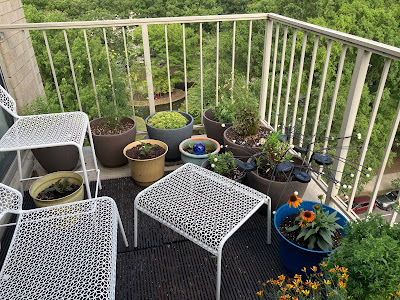
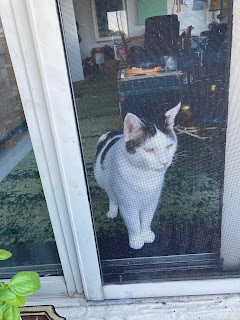
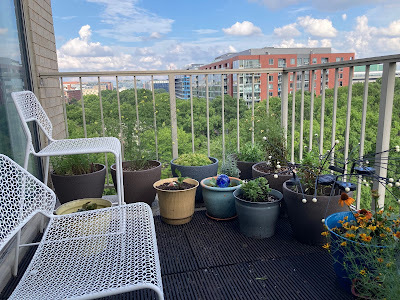
We're really lucky that my position at Davidson College offered a chance to get some perspective (and, to be honest, stabilize our finances). And I’m extremely grateful that Maestro and UNO, in a very short period of time, have provided so much foundational trust and camaraderie for me to build on when envisioning the commitments of future years. Our family and friends have lifted us up over and over, in the past year. A lot has happened. There's also a lot to look forward to.
Here's the thing: the universe can only give you new opportunities if you free up space in your life to hold them.
November 12, 2022
Dear Graduating MFA Students
You. Do. Not. Need. To. Go. Into. Academia.
But I love teaching!
Then teach!
I understand feeling that teaching is a vocation that you're called to, enjoying the community that it provides, and wanting to incorporate it into your path of professional experience. But you can do those things without making teaching with being your primary source of income and (ahem, America) health care. For decades, every major city in the United States has had at least one if not multiple community-led spaces for workshopping poetry, fiction, and nonfiction. During the height of the COVID-19 pandemic (not that the pandemic is over, nota bene), these organizations had to adapt to moving all their learning opportunities online. Most of these organizations are keeping those channels open, understanding the ways that online learning can increase equity and access--which means that even if you don't end up living in a major city, you can still offer a class through that hub.
Just a few of the places that you might pitch regarding workshop proposals:
GeminiInk GrubStreet Lighthouse Writers Workshop The Loft Literary Center The Poetry Barn The Writer's Center
Note, what you'll want to do first is write a short, polite note to someone on staff, requesting to be added to the email list that calls for pitches. They probably reach out to their existing pool of instructors 1-4 times a year to gauge interest, with set deadlines for submitting ideas. Be prepared to give a brief (one paragraph) introduction to your education and background, including any journal pub credits, and a couple of sample courses (at the very least, indicate the genres you did your thesis in). Do play up any local connections, even if you're hoping to teach remotely. For remote teaching, clarify whether you're drawn to synchronous learning (using meeting platforms such a Zoom) or asynchronous (in which you build the course content entirely in written form, online, and post feedback, versus orchestrating the live workshop experience). Plan a class that can be excused successfully in 4-8 weeks, OR one standalone session (typically informational or generative, perhaps focusing on a single shared text, versus something that is discussion- and feedback-based).
If you find your initial queries to organizations such as these aren't getting traction, or if you ge the chance to offer a class but it fails to "make" the minimum numbers, don't despair. You may you need a little more time to develop your record of publication. Sometimes these organizations can create enrollment draw based on the topic alone; other times they are looking for the added value of the instructor's reputation.
Consider cross-referencing your passion for writing with another cause you feel passionate about--such as working with the LGBTQIA+ community; people who have experienced domestic abuse; outreach to unhoused or incarcerated populations; mission-driven organizing (environmental or social justice); or working with specific age groups, such as middle-grade children or senior citizens. Look for organizations whose work is in those sectors, versus being squarely in the "literary writing and publishing" space, and ask about opportunities to bring a creative workshop component to any existing outreach programs. Be prepared to volunteer your services at first, and keep your time commitment proportionate to that (1-6 sessions, max), but trust that it is legitimate and useful experience to build a CV.
Since these organizations tend to have a firmer and specific geographic radius of reach, I can't offer a general guide. But here are a handful of exemplar DC-area organizations that I know to have utilized volunteer service to lead creative writing or storytelling workshops in the past:
826DC DC Scores OutWrite Sitar Arts Center Split This Rock Street Sense Media
Don't forget to consider querying local museums, libraries, and (if a comfortable fit) churches or centers for faith-based gathering as well.
Okay, okay. So maybe I don't have to go into academia to satisfy my love of teaching. What do I do instead to pay the bills?
If you think you don't have options beyond academia, please understand, that's not evidence of a limited capacity or skill-set on your part. That's an institutional failure to think outside the models at hand; meaning, most of your mentors are they themselves in academia, and have been for at least 5-10 years, if not their entire professional lives. Remember, you came to an MFA program because you wanted to write and publish books, right? Choose the job that sustains that goal.
Here are three ways that non-academic jobs may actually be better suited to nourishing your writing-career aspirations:
-The job has clearly defined hours from which you can can clock out, versus the constant "I should be prepping..." The emotional stakes are typically lower; yes, you may stress to meet a proofing deadline or make a big presentation, but you won't have the well-being of students on your mind. At-office jobs may provide infrastructure resources (e.g., printing, internet) that you can occasionally divert towards your own projects. Academia loves to talk about funding attendance to conferences, but it's rarely enough to offset the full cost of a trip, whereas if you travel for business outside academia they will take responsibility for the full docket of expenses (and you still get to do a little sightseeing on the side).
-Vacation weeks can be taken year-round in non-academic jobs whereas, in academia, your "time off" is attached to very particular and inflexible seasonal windows. Those are the same seasonal windows that every other academic applying to artist colonies and residencies are requesting, which makes those periods hyper-competitive. If you get an opportunity whose duration exceeds your available vacation days, and you've been working at the company for more than a year, consider presenting your notification of acceptance with a thoughtful request for additional days as unpaid leave; this may be a viable option, especially if you're willing to be available for emergency contact if needed.
-You're organically doing "research" outside the realm of literature, which can provide the grist of settings and subjects for your manuscripts. Building a creative landscape on the pedagogy of learning is challenging to do in interesting ways; drawing on the lives of your students, when building characters, poses deep ethical concerns. In contrast, there's a bold tradition of situating stories in non-academic labor landscapes and, even if your office setting isn't dynamic, you'll benefit from the variety of life experience you pick up on in conversation with work colleagues. Any job that expands your vocabulary--whether by introducing the dictions of science, tech, medicine, law, even economics--is a net gain.
If you're reading this as a graduate student local to DC, I'd like to amplify: please consider staying! This area is unusually deep and varied in terms of these kinds of non-academic opportunities for employment in writing and editing. For example: federal and city government and funded-initiative offices (i.e., Golden Triangle or SWBid), advocacy non-profits, science and tech organizations with national membership and DC headquarters, plus straightforward media organizations such as The Washington Post, NPR, National Geographic Society, and The Atlantic.
How do I find these jobs in writing and editing?
As a starting place, try Indeed and Idealist, searching using key terms such as "writer" and "editor." If a job asks for 1-2 years of professional experience and you didn't work during your MFA years, don't be afraid to apply anyway. Those kinds of stipulations are just meant to ward off completely unqualified candidates; if you're a match in other ways, and you have a good interview, they'll trust that your learning curve will be sufficient for you to catch up. (If they're requesting 3-5 years, don't apply unless you have legitimate professional experience you can cite, though you can be liberal in teasing out "writing and editing" from a previous job that was not explicitly labeled as such, such as grant development or paralegal work.)
What do I need to be prepared to apply for these jobs?
-A resume of one page that leads with professional experience, then education history, then other skills such as languages and office software proficiencies. You can add characterizing language under the professional experience, typically 2-3 bullet points of descriptive language. Emphasize strong and active verbs, yet drop the "I" whenever possible; may read as a fragment, but that's okay. Play up any significant scales in terms of budget or populations served. (That said, keep your multi-CV up to date! They are so, so hard to create later if you do come back to academia, especially in terms of tracking real-time readings and journal publications. Trust me on this point, this was my hard-earned lesson.)
-Be familiar with the likely format of any "tryout." In terms of writing tests, they probably don't want to see that ten-page essay with MLA citations that you wrote. They probably want to see a 500-1200 word sample press release or blog post that reflects the vocabulary of the organization, with straightforward syntax and language that is musical but not self-indulgent. Hold off on the metaphors and similes for now. If you receive a proofing test, anticipate a letter to shareholders, a white paper (a particular type of in-depth report associated with non-profits), or a case study. Here's a couple of round-ups of exemplar case studies:
HubSpot, "28 Case Study Examples Every Marketer Should See" Breadcrumbs, "13 Brilliant Case Study Examples To Be Inspired By"
...You'll be expected to provide both objective corrections, fixing typos and grammar, as well as subjective style considerations around syntax, formatting, and diction.
-References (but not letters, thankfully). If your references are former professors, give them a heads-up so they know to praise the appropriate qualities. If you did something outside the classroom that is relevant--such as working with the school-hosted literary journal--make sure they know your scope of experience so that they don't default to discussing "scholarship" and "creative talent." Those great qualities may be be counter-productive to emphasize here; you don't want the employer to be scared off by wondering if you'll stay.
Wait. Back to that editing test; I don't have the chops! What am I going to do?
Well, you gotta learn if you want to make money as a professional writer and editor. There's no way around that. I'm not saying that your creative work needs to hew to the rules of Western colonialist culture; there's all kinds of good arguments contrary to that kind of absolutism. But there are few downsides to having a broad array of tools at your disposal, so think of this as a tool you're taking the time to acquire. (Also, this was going to come up if you stayed on the American academic track.) Fortunately, there are a couple of reasonably priced resources for online learning of professional writing, field-specific copywriting, and editing. Approach these classes the same way you'd take a chance on a Duolingo course:
LinkedIn's Online Courses [1-month trial / $19.99 a month] MediaBistro's Online Courses [2-week trial / $14.99 a month]
If you want a litmus test of your copyediting skills, the New York Times did a series of "Copy Edit This!" quizzes spanning 2016-2019; I believe there were 17 in all.*
"Copy Edit This!" Quiz No. 1 "Copy Edit This!" Quiz No. 17
(*Now that you know the title convention, you can search out the ones in-between.)
The good news is, you probably have all kinds of intuitive skills that you regularly apply--and take for granted. They just need a little sharpening.
MFA students, I am rooting for you. I believe that a 2- or 3-year program, whether residential or low-res, can provide a real and specific good of sowing the seeds of a creative writing pursuit. Anyone who says the MFA is a dying degree, due to the ascent of the PhD in creative writing, is myopically focused on the belief that graduate degrees in creative writing should lead to a full-time teaching job. There are other paths! Paths that are open and waiting and (dare I say it) may even be a lot more humane and nourishing to you as a writer.
Go get 'em.
In other news: I'm here, waving from DC, as I do from time to time. Won a prize! (Yay, seriously yay.) Was a finalist for another prize. Working on a proposal for the next book. Wrote a thing for American Poets . The paperback edition of Made to Explode will be out in December. Come March 2023, I'm going to be part of an AWP panel in Seattle that is getting the support of livestream, captioning, and ASL interpretation, which makes me very happy. I am both teaching at American University, and not-teaching (e.g., freelancing) with a pretty great company called the Maestro Group, a company that has ties to my high school, and which invites me to write funky blog posts for them such as this series:
"The Art of Sales: Embracing the Hustle" "The Art of Sales: Sharpening Visual Perception" "The Art of Sales: Taking Your Time" "The Art of Sales: Activating the Audience"
And in closing, I'll give you a snapshot of Sal the Wonder Cat, just because.
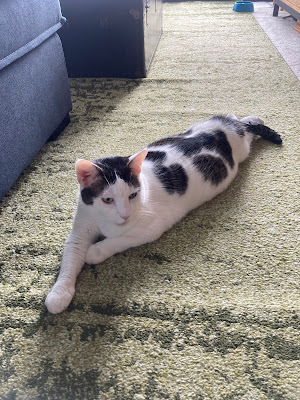
Sal is also rooting for you, always.
August 20, 2022
Buckle Up
When opening the Blogger interface, I am struck by how much things have changed. Hello, hello out there. Is this thing on? I think, as well, about my footprint of "SBeasley" and "SandraBeasley" across the web. If the internet is around in a hundred years (assuming civilization as we recognize it is around in a hundred years), generations that come after us may consider it wildly shortsighted that we were allowed to claim whole internet domains and social media spaces simply by way of being the first person, with a particular name, to think of seeking ThatName.com.
Or maybe the point is that there will always be newer platforms that create space for the next generation to stake their unique claim.
I try to be reasonably tidy in terms of my internet presence in terms of website, Facebook, and Twitter. The two outliers are Instagram--newest platform for me, and I'm not sure how I want to use it--and this blog, oldest platform for me, and I'm not sure how I want to use it. (In this respect, Janet Fitch is a kindred spirit.) Today, I'm just bulletin-boarding my 2022.
In order to explain 2022, I have to rewind and explain the years prior, specifically the academic years. The simple version of the story is that I got to serve as American University's Visiting Writer in Residence for AY 2020-2021, and 2021-2022. What I loved about my time was leading the graduate workshops in creative nonfiction, advising MFA students on their thesis work, teaching a LIT 215 undergraduate course called "Writers in Print and Person" (a class I've had an adjunct relationship with going back to 2014), and learning to teach LIT 107, the "Intro to Creative Writing" class that spans all genres.
I have never had the security of a multi-year contract in teaching, much less a tenure-track job, which makes it harder to measure pedagogical growth. But I used this sustained appointment to adopt a contract grading policy for undergraduate teaching, with an emphasis on equity; to re-invent my workshop technique with graduate students, abolishing any "cone of silence" tradition; and to conceptualize a 300-level literature class, "The Ethics of Writing Creatively," which was ultimately approved to fulfill AU CORE's Ethical Reasoning requirement.
Wait; I came here for a chick who digs poetry, not a chick who digs teaching.
Teaching fuels the poetry, I promise. But it's also true that publishing a book of poetry during a pandemic is really hard! I haven't gotten to do many readings for Made to Explode since it was published in February 2021. The paperback edition of Made to Explode will be out in December of this year, and I hope that gives the collection a second chance to make it into reader's hands, and maybe even people's classrooms. In the meantime, my spirits were considerably lifted by learning that the Library of Virginia has named the book one of three finalists for the 25th Annual Literary Awards, in the poetry category. Alongside books by Tina Parker and Rita Dove (mentor & hero, no pressure).
The pandemic has made it difficult to think expansively over these past few years. Our emphasis has been on hunkering down and surviving. But I came into the summer with something like Big Hope, in part because a next nonfiction book (a collection of essays in unconventional forms) has been coming into focus. After the brief spring "tests" of driving first to AWP in Philadelphia back in March, then a literary festival at Clemson University, I lined up substantive summer travel in the form of two residencies--first ten days at A.I.R. Studio in Paducah, Kentucky, and then all of June at the Storyknife Writers Retreat in Homer, Alaska. Both offered responsible options for quarantining (if needed) and staying safe, while also furnishing the community I've craved.
Those residencies were amazing. Full stop. Storyknife, in particular--we were on the Ring of Fire, with volcanos on the horizon! in the solstice season, meaning, 20 hours of light a day! six women writers, gathering around a dinner table!--took my breath away.
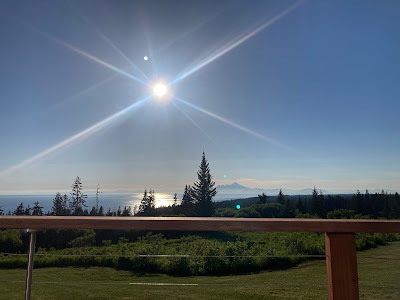 8 PM Sky in Homer, Alaska (July)
8 PM Sky in Homer, Alaska (July)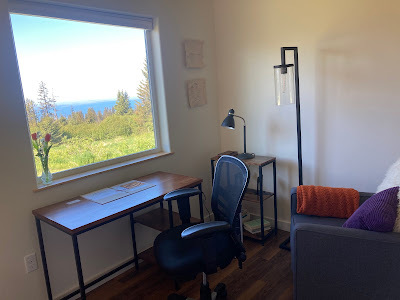 Evangeline Cabin Studio Desk
Evangeline Cabin Studio Desk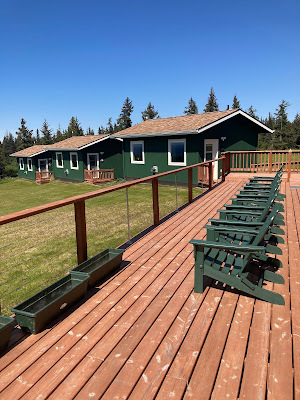 Residents' Deck of the Main Cabin
Residents' Deck of the Main Cabin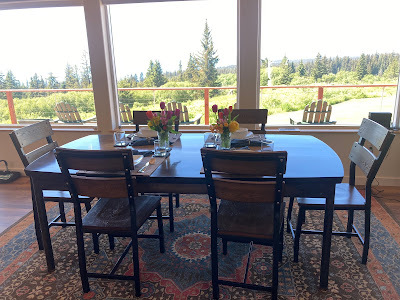 Communal Meal Table in the Main Cabin
Communal Meal Table in the Main Cabin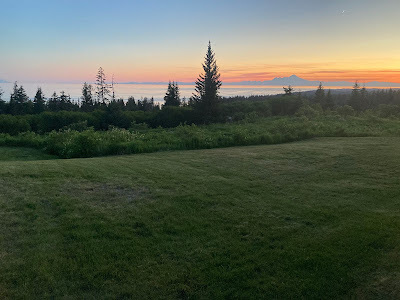 8 PM Sky in Homer, Alaska (July)
8 PM Sky in Homer, Alaska (July)I used my time at these two residencies to read, write, and refresh. So there's no easy way to segue to what came next: on my last full day in Alaska, I got the call that my husband was in the hospital back in our home of Washington, D.C. He spent most of July in the ICU. Now we're wrapping our heads around what comes next. I had to resign my Visiting Writer-in-Residence position at American University for Fall 2022. I had to defer a plan to join the faculty of the University of Nebraska's low-res MFA. I have no choice but to slow down, to be present in the moment, and to be grateful for the company I'm keeping. (And, in a brief nod to the fickle cruelties of the American medical system: to remember, money isn't real.)
That's the thing about life--it keeps changing, right out from under us.
January 11, 2022
January Jump
When I opened my laptop at the end of December, determined to post to this blog once more before the close of the year--well, that's how I found out Betty White had died. I thought, Nope, see you in 2022. I closed the laptop's cover. If you've struggled with social media for this past year, I get it. I've needed to go silent for long periods. That's particularly painful when the pandemic hasn't given us a chance to connect in other ways, because it can feel like damned-if-you-do, erased-if-you-don't. But I'm grateful because when I look back at the second half of 2021, I spot bright glimmers of living, of pleasures taken, seized in a time that felt dark.
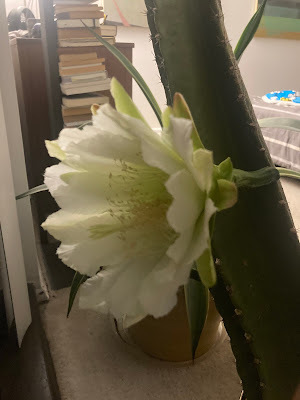
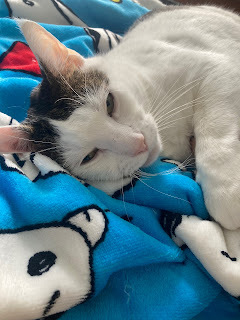
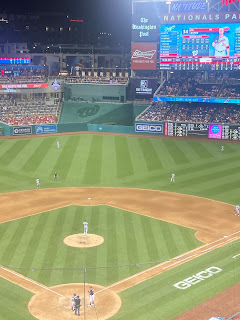
I went to Nationals games, mostly with my dad, and we cheered when the team was good and hung on even when they were terrible, having traded away almost all our star power. The cactus in our bedroom bloomed a half-dozen times. Sal the Wonder Cat kept us amused, though for a stretch we had to refocus on his critical care--a crisis he came through thanks to Marshall Veterinary Clinic and VCA SouthPaws.
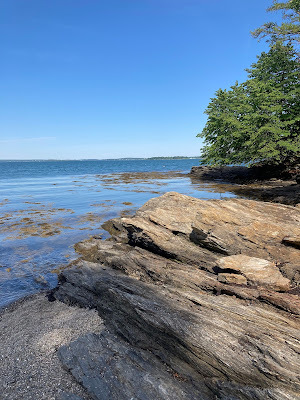
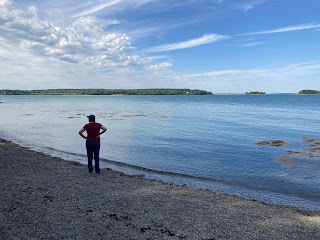
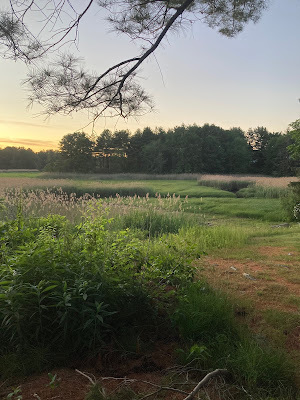
We took advantage of the post-vaccine, pre-variant lull to visit friends in Maine; one of them, Maureen Thorson (pictured distantly on the shore), has a great poetry collection coming out next month called Share the Wealth. We went sailing and ate many oysters. Their house backs up against a stunning Audobon preserve.
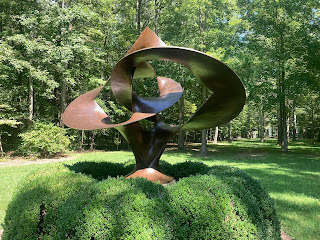
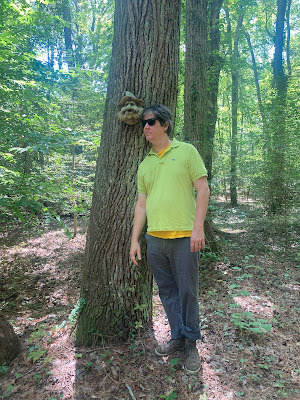
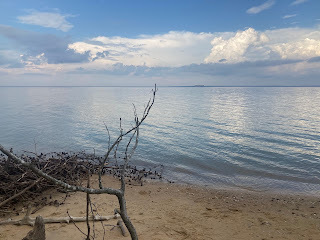
The day before fall classes started at American University, my husband and I day-tripped down to the Annmarie Sculpture Garden & Arts Center --the planned part--and added on a dusk hike to Calvert Cliffs--the unplanned part. My semester was good but busy. I instituted contract grading, which is a larger conversation I'd like to have; not sure if this blog is the place to do it. I had very few chances to gather in-person with writers, which is usually a big part of why I teach, but we did have a lovely reading at GoodWood on U Street. That doubled as a chance to say goodbye to longtime local fiction writer Leslie Pietrzyk , who moved down to North Carolina. Fortunately I think she'll be back to visit because her new story collection, Admit This to No One , is all about DC.
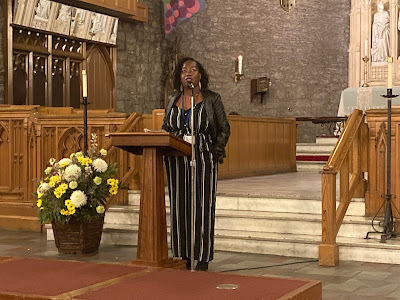
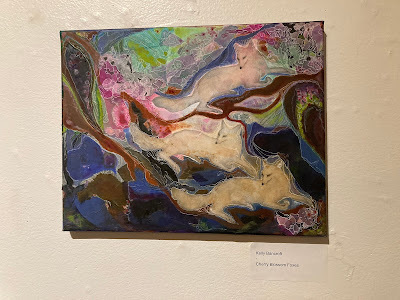
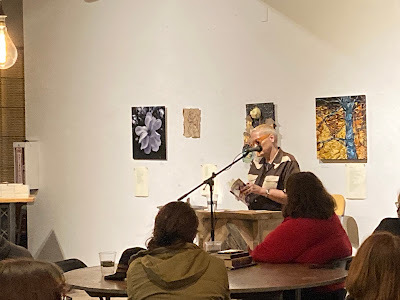
My one bit of book-travel was for Lit Youngstown, and poet Teri Ellen Cross Davis was a much-needed passenger for the long drive to Ohio. I got to give a lecture on the golden shovel as a form, and introduce Jan Beatty for the closing night reading. The unexpected gift was a painting by Kelly Bancroft inspired by my prose poem, "Cherry Tree Rebellion."
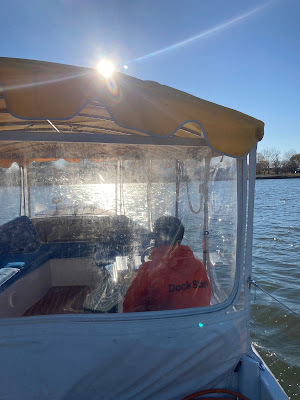
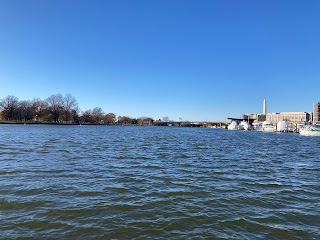
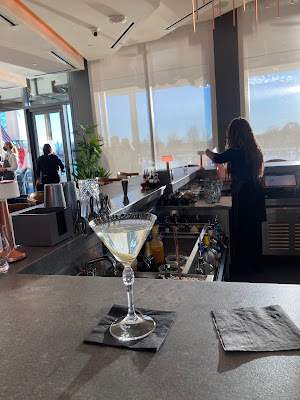
Our neighborhood is right by the water, and I've tried to take advantage of that--there's no quicker lift to my spirits than a walk along Hains Point, and for many months a free jitney ran back and forth across the Potomac Channel for the sake of the neighborhood. The Wharf restaurants are too expensive to visit regularly, but one quiet afternoon I treated myself a a Vesper and worked on an essay collection.
I'm very ready for the new year. Let's be honest, that exactly what I said at the end of 2020. 2021 did right by me in many ways. I put out my fourth collection of poems, Made to Explode , and had work appear in three anthologies. My family got to celebrate my sister's wedding in October at Glen Echo, and we managed to safely host my husband's family for Thanksgiving; these are immeasurable gifts. And yet I'm ready, I'm ready, and daring to be optimistic. I hope you are too.
June 12, 2021
Still a TJ Kid at Heart
There are moments when I nourish the instinct to get away, and moments when it feels incredibly rewarding to have stayed so close to home for so long. Evidence of the latter has been a recent dialogue with Fairfax County's Public Libraries, which provided refuge on many a day growing up. Our conversation has resulted in both an hourlong "Meet the Poet" event recorded online last week (which you can view here) and an upcoming July seminar, free, on "Narrative Strategies and Truth-Telling in Nonfiction," intended for folks interested in self-mentoring themselves toward writing a memoir.
On the heels of a virtual 8th Period visit with the TJ Poets Club for National Poetry Month in April, Thomas Jefferson High School for Science and Technology asked me to speak at their graduation ceremonies. As an alumna, I couldn't imagine saying no. But as the date neared and it got really real, I wondered how I was going to use this chance--all six glimmering minutes of it.
The actual morning of ceremonies was a flustered affair, because the administration had only gotten the green light for an in-person gathering less than two months prior. My husband and I trekked out to Woodson High School in Fairfax on the first blazingly hot day of summer. A bunch of us tried to access the football field one way, then turned around and got told we would have to backtrack. I realized I didn't have a contact phone number for anyone. Seconds were ticking down to the 9 AM start time.
But somehow (after being yelled at for accidentally stepping on the track), we found our way to the incoming march of TJ faculty. I felt tremendously relieved to spot Marianne Razzino--fellow member of the Class of 1998, now mathematics teacher--who was holding a black robe and generic regalia to throw on over my dress. Next thing I knew, I was sitting on a stage facing the Class of 2021.
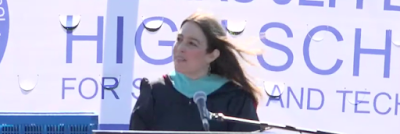
Here's what I had to say, opening with a few ad-libbed observations as I eased into the strangeness of the task at hand~
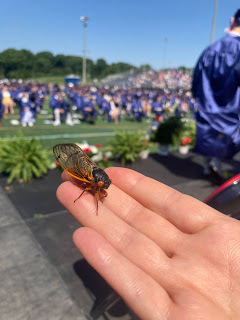 Thank you for that wonderful introduction; thank you for choosing me to be here; thank you to my own former classmate, who made the regalia sit on me. I'm really honored. I'm glad to be here at Woodson, site of many a Thomas Jefferson High School Homecoming victory, and in the company of...cicadas.
Thank you for that wonderful introduction; thank you for choosing me to be here; thank you to my own former classmate, who made the regalia sit on me. I'm really honored. I'm glad to be here at Woodson, site of many a Thomas Jefferson High School Homecoming victory, and in the company of...cicadas. I know that you are a good, honorable group of people, because during this time I have watched multiple cicadas land on you, and you've found gentle ways to--[hand gesture]. I haven't seen a single one swatted or squished yet. I appreciate the pacifists among us.
Years ago, I actually auditioned to be the graduating speaker for the Class of 1998. I was not chosen. So I thought about digging up that old speech. Pulling it out, tearing away the dot-matrix feeder strips; if you don't know that reference, ask your parents later. But the world that we lived in, in 1998, is so different from the world we live in now.
I wanted to speak to you all as an alumna. I wanted to give you the most direct and hardest-earned knowledge that I could offer, and I'm following some amazing comments that have been made already. Forgive me that , in typical TJ fashion, I working on these comments 2 AM on the day they were due.
I’ve got five minutes and I've got three things to tell you.
First, I want to talk about a honey fungus in Eastern Oregon, Armillaria Ostoyae. I know. Stay with me. It's the largest creature on earth—it's the size of sixteen football fields—and it lives mostly underground. The bad news is this mushroom isn’t allowing the coniferous trees above to grow. But the amazing news is that parts of the organism are 8,000 years old.
And then, I want to talk to you about the octopus, and the fact that it has three hearts and dark-blue blood. I want to talk about how capybaras are the friendliest creatures on Earth. I want to talk to you about DNA, and black holes.
Science is the language that humans use to articulate wonder and curiosity, and it is beautiful thing that every one of these students, every one of you, speaks that language of science. You can go into any number of professions—you can become lawyer, restaurant owners, even a poet—but I can guarantee that your success in whatever field you choose will be enriched by continuing to learn about the science and technology of this world. So please, always hold space for that.
Second, I know I am talking to a crowd that is expert at cramming, at acing, at burning the candle at both ends, whatever metaphor you want. I say this with love: please, now, if you aren't already, think about your mental health. Think about taking care of yourself. Build your reserves. Recognize that the You who gets a B is worth just as much as the You who gets an A.
And I love that I wrote this message to you all last night, but I've already heard it echoed today. I heard your principle say it, and I heard your classmates say it, and that tells me that you all are thinking about these things. Because I have been where you are. And, trust me, there will come a time when all-nighters are no longer an option, okay? All the caffeine in the world will not allow you to activate the way that you're able to activate right now. I n addition to being brilliant, high-achieving performers, you might want to be good partners, loving parents, or simply people with lives outside your work.
You are more than your productivity. To loosely cite Voltaire—whose Candide I read in Ms. Curtis’s AP Literature class—do not let “perfect” be the enemy of good.
The third thing I want to say is that you are so fortunate in the company you have kept for these last four years, even when it was over Zoom. I move among artists, who tend to congratulate themselves for being interesting. And they are. But honestly, person-for-person, your classmates at TJ are the most interesting cohort of people you’ll ever meet, and their names will constellate the sky of every imaginable profession, every geographic location, in the years to come. So keep track. Don’t disappear on each other.
Doesn’t mean you have to say these were the best years of your life and, in fact, I hope aren’t. I hope the best is ahead of you. But trust me when I say that the bonds forged in the fires of this high school mean something.
I look out and know that I am looking at the people who will shape our world in the years to come. The great part is, I trust you with that world. I have seen so many signs that this generation is talented, adept, inclusive in your social values, generous with your spirit. I ask only that you take care of yourselves, and take care of each other. Thank you.
As the ceremony shifted into presentation of diplomas, I realized that my placement--you could draw a straight line from the photographer's camera, to the principal, to my chair--meant that I'd be photobombing graduates as they received their diplomas. Sitting and smiling through 400 names is no joke. But it wasn't hard to smile, watching their individual energies as each person cued up to cross the stage. They fussed with their tassels, they stood on tiptoe, they double-checked which hand they were supposed to extend. "Whatever feels good to you, man, just go with it," one of their faculty advisors said, clapping his hand on the back of a student.
Watching a wave of blue caps flip into the air, what I felt was gratitude. And hope.
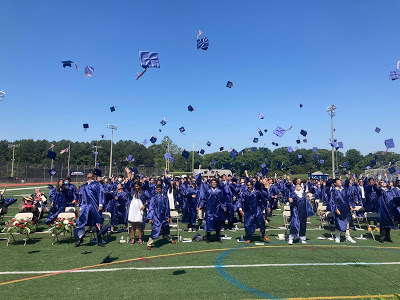
May 4, 2021
Poetry in Bloom
1:30 AM on the (very) early morning of my 41st year, and I'm giving myself the birthday present of a blog post I started drafting (checks notes)...oh, back on April 11.
National Poetry Month is always busy, especially with a new book in hand, but this year the events were all from my office--my Zoom corner. I have missed traveling on a profound level, because those long drives turn out to offer the time when I mull new projects. On the upside, never have I gotten to give so many readings while barefoot; two highlights were my event hosted by Politics and Prose, with Teri Ellen Cross Davis, and my event for The Writer's Center with Kim Addonizio. And my husband has held down the fort magnificently in terms of cooking dinner most nights.
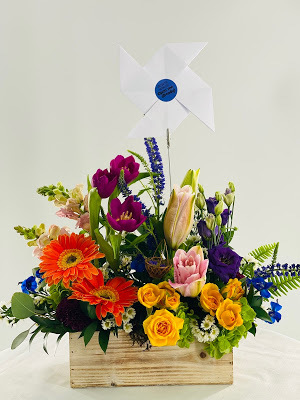
April also marked my first experience coordinating an event for the O, Miami Poetry Festival . The challenge in proposing a project for 2021: to what extent would people be interacting? How could we create something fun, but also safe? I reached out to Neil de la Flor last fall (great poet, lives in Miami, always has interesting ideas), and something came up organically in conversation--that his family had a multi-generational business in floral deliveries. One thing led to another, and we partnered with SWWIM to curate a selection of poems inspired by flowers, which then went out in bouquets delivered by Dolly's Florist.
My contribution, other than a general habit for task-mastering, was to conceive delivering the poems in origami form--something that could sit decoratively in a bouquet and invite unfolding as a tactile interaction. Since I turned out to be the only origami enthusiast on the team, this also meant the literal hunkered-down time of folding 150 pinwheels. Felt good to do something hands-on, since I couldn't actually set foot in Miami.
I've loved origami since I was a kid, taking classes on how to make cranes at the McLean Community Center. One thing I thought about as I worked in the (once again, very) early morning hours is how I used to try and rush through the preparatory folds; the moments in process when the paper has to be creased, then uncreased, to ease a later move. Younger Me thought that was a waste of time, that surely I could finesse the move without it. Older Me understands the necessity. Maybe there's a metaphor in there somewhere. I'd like to think that the challenges of 2020 were, in a sense, preparatory folds for some great move ahead.
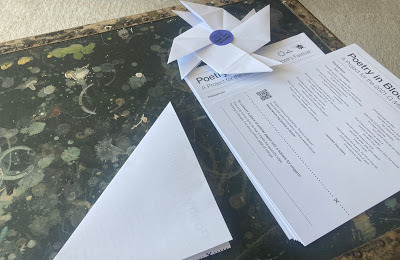
Some other things that happened: I logged on at 5 AM on a Friday to hear the work of a friend I made in Cyprus, an international poetry discussion only possible across Zoom; I got to virtually visit my old high school, which has asked me to speak at their (in person!) June graduation proceedings; I wrapped up a semester of teaching creative nonfiction workshops at the undergraduate and MFA levels, which proved a particular delight; we refreshed the balcony planters with a new type of sedum, "Indian Blanket" (Gaillardia pulchella, a wildflower), tomatoes and peppers; Sal the Wonder Cat continued to loll his ridiculous self across every conceivable surface of this apartment.
Perhaps this is a trite thing to say, but I do appreciate you coming by this blog. I don't update it as often as I could, or should, or want to. But it's a good, sturdy little tether that binds me to remembering the question of whether I would ever publish a book at all, and therefore how quintessentially lucky this life has been. I'm happy you're here.
February 28, 2021
The Golden Shovel: On the Legacy of Ms. Brooks and the Future of the Form
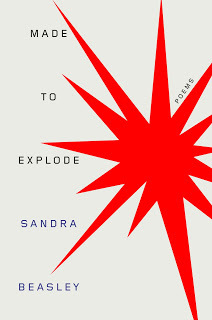
Made to Explode is out! I want to pause and celebrate that, even though I couldn't do what I would customarily do--fill a room with folks, several times over and within a 14-hour driving radius, for readings and hugs and pints and signings. March and April will bring a number of online, Zoom-based events (check out my schedule on the right-hand side of this blog), but I miss what tactile reality. Still, it is a gorgeous book and I'm grateful to W. W. Norton , my blurbers, and for those who have already reached out to say they are reading it. If you think you might want to teach the book and want guidelines, or even a virtual classroom visit, just reach out and let me know. The life of a poetry collection is long--this is the hardback, there will be a paperback incarnation, and there will be the chance for future conversations.
I aim for each of my collections to have a couple of craft conversations going on. Count the Waves was about iterative modes, and included six sestinas and a series in dialogue with "The Traveler's Vade Mecum." Made to Explode is the first collection where I've deeply engaged with the prose poem, particularly in a series of monument and memorial interrogations with the title "____, Midnight," meant to evoke visiting those places in the liminal nighttime hours. But it's also a collection that holds two Golden Shovels, and I wanted to write a bit about what that form's (relatively brief) history, its implications, and how it might advance into poetry's collective consciousness.
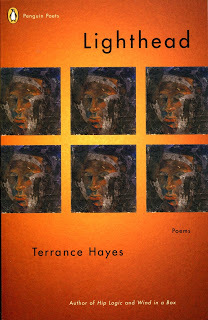
In 2010, Terrance Hayes published Lighthead, his third collection, which would go on to win the National Book Award. In the notes at the back, he spends the most time defining the pecha kucha, a mode based on the format of Japanese business presentations. But he also acknowledges that his poem "The Golden Shovel" "is, as the end words suggest, after Gwendolyn Brooks' 'We Real Cool.'" A few entries later, he notes, "'The Last Train to Africa' is after Elizabeth Alexander's poem 'Ladders.' Like the form used in 'The Golden Shovel,' the end words come from her poem." Hayes would later elaborate on the backstory, which involved asking his two children to memorize poems--one by Langston Hughes, the other by Gwendolyn Brooks--and, after becoming preoccupied with their nightly attempts at recitation, deciding to "string the whole poem down the page and write into it." Multiple drafts resulted, two of which made it into the collection.
"The Golden Shovel" would be a striking, classroom-friendly poem under any circumstances, because it showcases Hayes' gift for the heightened lyric vernacular, his disciplined and yet playful lineation (sometimes enjambing mid-word), and an ongoing thematic concern with the father figure. But something caught afire about this "nonce form"--a term I assign because it's invention that can be credited to a particular poet, in a particular moment, that may or may not carry forward. What fueled interest is both excitement for Hayes' work and shared reverence for the figure of Gwendolyn Brooks (1917-2000), an incredibly brilliant poet--the first Black poet to win the Pulitzer Prize, the first Black woman to act as poetry consultant for the Library of Congress. The opportunity to teach these two important voices in conversation helped move the form from the realm of "nonce" to "contemporary form," as multiple poets began engaging the mode at the same time.
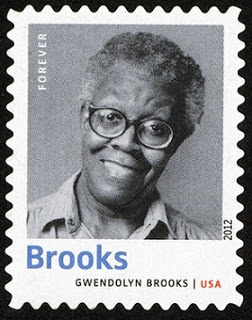
The chief engineer of this initiative is Peter Kahn, himself a noted poet with an MFA from Fairfield University who, as a Visiting Fellow at Goldsmiths-University of London, founded the Spoken Word Education Training Programme. Kahn has taught in Chicago's high schools since 1994, and his investment in distilling and assigning the Golden Shovel to students seeded a cohort of young poets. He co-edited, with Ravi Shankar and Patricia Smith, The Golden Shovel Anthology: New Poems Honoring Gwendolyn Brooks , which came out in 2017 from the University of Arkansas Press. The anthology's intent, which Kahn described in an interview , was the place student work alongside that of more established poets, all of whom would constitute a "second generation" to Hayes' original experiment. Hayes' blessing, in the form of introducing the anthology, offers the clear dictate that "the 'Golden Shovel' form belongs to no one so much as Ms. Brooks. Peter Kahn, a citizen of Brooks' Chicago understands as much."
My contribution to the anthology is "Non-Commissioned: A Quartet," which uses the text of Brooks' opening in the "Gay Chaps at the Bar" series. Brooks' sonnet is a poem I have taught countless times, often in tandem with Gregory Orr's theory of the four temperaments. (In the original theory essay, considering the possibility of a poet who might perfectly balance story, structure, music, and imagination, Orr offers up the model of William Shakespeare; I'd counter with the model of Gwendolyn Brooks.) I won't try to unpack my own poem here, other than to say it's thinking about the experience of 20th-century soldiering; before appearing in the anthology, the poem won the 2015 C.P. Cavafy Poetry Prize from Poetry International, and now it appears in Made to Explode.
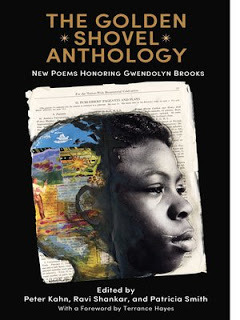
Brooks is one of my favorite poets, full stop. So it felt organic to spend the hours required to "write into" one of her poems. Yet I also became increasingly aware of the forms' challenges--if we break the full text of a sonnet into a series of end words, we are talking about a really long poem (~100 lines). I was not surprised, in looking through the anthology to see that most people opted for briefer excerpts of longer texts. This flexibility has resulted in contributions from amazing folks, more than might have taken part otherwise, and it is fun to see how they intersect based on the common choice of a Brooks poem: both Aracelis Girmay and Hailey Leithauser, for example, write into "The Anniad." Other poets taking on lines from "Gay Chaps at the Bar" include CM Burroughs, Laura Mullen, Christine Pugh, Danez Smith, and Lewis Turco (and, though he didn't make it into the anthology, Reginald Dwayne Betts).
Will the form survive into becoming not only a contemporary form, but a received one? I don't know. Should the form be prescribed as specifically a tribute to Brooks, that uses her poems exclusively? Even Hayes himself uses the form on an Elizabeth Alexander poem (though it should be noted that they're kindred spirits, and Alexander edited The Essential Gwendolyn Brooks). Can the "Golden Shovel" be relaxed into a form that uses any previously published poem, as the description in this Writer's Digest entry suggests? What about song lyrics? Does an author have any responsibility to pick up the concerns of the original text?
I felt compelled to work within the entirety of each Brooks poem in part because I wanted to guarantee any reader's immediate access to her poem's entire text. One of the things I love about this contemporary form is the title, which is actually a matter of relative coincidence: the "Golden Shovel," in the epigraph to the original Brooks poem, is the name of the pool hall where these seven youths gather. But as I've broken it down when explaining the form to students, the title contains somewhat paradoxical impulses: to make something "golden," a.k.a. to gild, but also to bury, e.g. the "shovel" at work. Because isn't even a celebratory occupation still a kind of colonizing? Am I truly writing "into," or am I writing over?
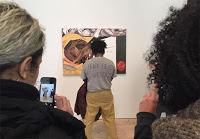 In this thinking, I'm guided by Solmaz Sharif's insightful later-wave meditation on erasure aesthetics,
"The Near Transitive Properties of the Political and Poetical: Erasure,"
which first appeared in Issue 28 (April 2013) of Evening Will Come: A Monthly Journal of Poetics. I'm also thinking about this as a white poet writing in tribute to and in (attempted) conversation with a poet held dear by the African-American community. "Non-Commissioned: A Quartet" is one of the oldest poems in Made to Explode. "Black Death Spectacle," which takes its name from Parker Bright's protest at the 2017 Whitney Biennial, is one of the last ones I completed as part of the manuscript. Parker wore a gray t-shirt on which he'd written that phrase, and stood between viewers and Dana Schutz's painting. The poem deals frankly and in a meta-mode with these issues, in part by applying the Golden Shovel to the entire text of Ms. Brooks' “The Last Quatrain of the Ballad of Emmett Till."
In this thinking, I'm guided by Solmaz Sharif's insightful later-wave meditation on erasure aesthetics,
"The Near Transitive Properties of the Political and Poetical: Erasure,"
which first appeared in Issue 28 (April 2013) of Evening Will Come: A Monthly Journal of Poetics. I'm also thinking about this as a white poet writing in tribute to and in (attempted) conversation with a poet held dear by the African-American community. "Non-Commissioned: A Quartet" is one of the oldest poems in Made to Explode. "Black Death Spectacle," which takes its name from Parker Bright's protest at the 2017 Whitney Biennial, is one of the last ones I completed as part of the manuscript. Parker wore a gray t-shirt on which he'd written that phrase, and stood between viewers and Dana Schutz's painting. The poem deals frankly and in a meta-mode with these issues, in part by applying the Golden Shovel to the entire text of Ms. Brooks' “The Last Quatrain of the Ballad of Emmett Till."
I haven't known what to write in people's books, as I send out copies of Made to Explode, any more than we've known how to begin and end our emails to each other in these twelve months of the pandemic. "Stay safe"? "Hope to see you again"? But one thing I've been able to say is that I'm glad to be a poet now, in this time, because poetry is complicated and robust. And considering our emergent forms, and how they will (or won't) propagate is a big part of that. Neither of my Golden Shovels has been published, to date, anywhere online. With that in mind, I'll share them here. But I would ask that they only be taught in full dialogue with the Gwendolyn Brooks poems that shaped them. So I will include those texts, as well.
Gay Chaps at the Bar
...and guys I knew in the States, young officers, return from the front
crying and trembling. Gay chaps at the bar in Los Angeles, Chicago, New York...
—Lt. William Couch in the South Pacific
We knew how to order. Just the dash
Necessary. The length of gaiety in good taste.
Whether the raillery should be slightly iced
And given green, or served up hot and lush.
And we knew beautifully how to give to women
The summer spread, the tropics of our love.
When to persist, or hold a hunger off.
Knew white speech. How to make a look an omen.
But nothing ever taught us to be islands.
And smart, athletic language for this hour
Was not in the curriculum. No stout
Lesson showed how to chat with death. We brought
No brass fortissimo, among our talents,
To holler down the lions in this air.
-Gwendolyn Brooks
#
NON-COMMISSIONED: A QUARTET
A Golden Shovel
after Gwendolyn Brooks,
“Gay Chaps at the Bar.”
I.
No one chose us. We
chose ourselves. What a man knew
in the concrete embrace of bunkers—how
or who—would never make it to
the foxhole. A sergeant catches the order
as it trickles down his just
commander’s leg. We hauled the
water. We led the dash.
We’re the vertebras necessary
so the skeleton can dance. We’re the
eighteen rounds in the length
of a minute; the fifty pounds of
an M1928 haversack. We’re the gayety
of five-card draw in
dead night, the muffled barter of good
smokes for bad booze. Privates taste
fear. A corporal will spit it out. Whether
a man remembers to thread the
diaper of his pack: the stuff of raillery,
except when it should
save your life. We chose to be
grenade men. There was no slightly.
There is no plum butter, no bread, no iced
tea, no lemon. There is a meat can, and
there may be meat in it. What’s given
to a boy as he trembles, as he turns green,
is the lesson of swim or
goddammitswim. You serve or are served
on a stretcher. Once home, belly up
to the bar and speak of the hot
dusks—how you aimed the mortar—and
remember us, who stayed in the jungles lush.
II.
The difference between liver and
foie gras, we were taught, is in how we
hold a beast’s head before feeding. We knew
the throat lining to be beautifully
calloused, like a palm. We learned how
to load the gavage, to
simmer corn in fat to give
their flesh fat in return. They told us to
keep the men. We discarded women
after hatching and the
smell was foul, but so goes summer.
We could almost taste the spread,
rich in iron, surrendering to a tongue the
way an ice cube melts in the tropics.
Nothing was wasted and of
the lies they’ll tell, that’s the worst: that our
care was a form of waste. It was love.
Everything stings less when
shot with rye. We took time to
pin tin to each swollen breast, to persist
even when they hollered or
the cage held more than it could hold.
We stroked their throats and called it a
sign of hunger
if they swallowed. We took off
shoes that shone with their filth. We knew
their feathers would not stay white.
No one had to give that speech,
nor show us how
their eyes would glaze when ready to
slaughter. How can I make
you understand? This is not a
form of betrayal. Look.
In the field, the officer’s job is to make an
office: anything else is an empty omen.
III.
But
nothing
ever
taught
us
to
be
islands.
IV.
If a mother cradles her son’s face and
praises how brave he is, how smart,
how nimble or athletic,
she is teaching him the language
of easy victory—ten points scored for
his team, the test aced, the prick of this
needle to which he did not weep. An hour
in the trench offered what was
a different dictionary. We do not
speak of smart, or brave, or honor in
battle. That’s for telegrams to the
parents, the posthumous curriculum.
Little sprinter, you have no
advantage in this marathon, no stout
legs to carry you to the finish line’s lesson.
Those soldiers who showed
grace with a bayonet understood how
the body must become a weapon to
be wielded; how every chat
is a conversation with
the self we want to save; how death
listens in, nodding. We
laughed at the lieutenants who brought
photos of sweethearts, because no
girl wants to kiss a mouth full of brass.
If the only volume is fortissimo,
it’s not music that’s playing. Among
every hour, what I recall is our
silences. Our greatest talents—
accomplishing with a look what to
a weaker man required a holler.
We raised them. We laid them down.
We learned faces but not the
names, and we left lording to the lions.
The roof of the house I lived in
had a chevron’s peak. I took in this
breath and then there was no other air.
-Sandra Beasley
[["Non-Commissioned: A Quartet" appears in Made to Explode, W. W. Norton, 2021]]
#
The Last Quatrain Of The Ballad Of Emmett Till
(after the murder,
after the burial)
Emmett's mother is a pretty-faced thing;
the tint of pulled taffy.
She sits in a red room,
drinking black coffee.
She kisses her killed boy.
And she is sorry.
Chaos in windy grays
through a red prairie.
-Gwendolyn Brooks
#
BLACK DEATH SPECTACLE
A Golden Shovel
after Gwendolyn Brooks,
“The Last Quatrain of the Ballad of Emmett Till.”
A man asks those viewing Open Casket what comes after
their shock, when from the
safe distance of cocktails the boy’s murder
becomes a matter of palette, of line and stroke, after
someone fumbles their way through the
—drowned? Was he drowned? Wasn’t the Chicago burial
a kind of show, they say, curated by Emmett’s
mother? The painter says, And I, too, am a mother.
Our tools seduce. Ask what the shovel is
burying. Know that the paintbrush sees only a
canvas: Make it yours. Make it pretty.
Carolyn Bryant is here and shit-faced
again and muttering that she couldn’t do a damn thing
to stop them, bacon burned, wheels off the
wagon, that if her husband had heard even a tint
of recanting he’d have slapped her silly. Of
course she’s here—moth pulled
to the flame, one kid jealous of another’s taffy.
Now that a white woman’s hands are all over this, she
wants in. Carolyn paces, paces, sits.
Ask the poet what gets colored in.
Ask the poet what gets colored in a
red
room.
Ask the poet who sits in a red room, drinking.
Most oil painters will not use pure black.
They build their black instead, from shades of coffee
and navy. When she
leans toward the painting she almost kisses
the tacky surface. There. She adjusts the spot-lamp, her
skin catching the glow off what has been killed.
Emmett Till is a fourteen-year-old boy,
quick to laugh and
to help his mother with the laundry, and she
offers driving lessons if they go to Omaha. But he is
determined to be Mississippi-bound. Does he say sorry?
Does he promise, next time? Before the chaos,
he tucks a pack of bubblegum in
his pocket. She brings him home to the windy
city so thousands can file by in their best church grays.
At the Biennial, the man’s T-shirt challenges those passing through.
BLACK DEATH SPECTACLE. They murmur over the bloom of a
wound, seeing red without seeing red.
Question the shovel, he says, that’d till this prairie.
-Sandra Beasley
[["Black Death Spectacle" appears in Made to Explode, W. W. Norton, 2021]]
#
Just a reminder of the Golden Shovel form--reading the end words of each of my poems, above, will embody the full text of the Gwendolyn Brooks poem cited in the dedication line. Please do not replicate these texts except for educational purposes. ~SB
January 24, 2021
Who Gets to Be "From DC"?
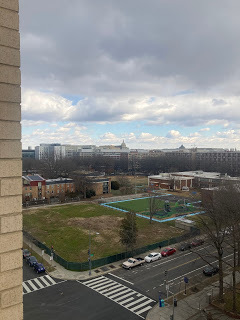
If I stand in the right spot of our ninth-floor apartment, I can see the Capitol. I looked this way a lot during the past week, anxiously checking for smoke or other signs of distress that might interrupt the days around Inauguration My gaze cuts across the vacant lot at 501 I Street SW, bare grass that has been the site of a hotly contested development plan since we moved to this neighborhood in 2015. If approved, the plan calls for a nine-story mixed-use building, and the Capitol will disappear. Never choose a place for the view, my neighbor reminds me.
When I give readings from my books, I am sometimes introduced as "from Virginia"; other times the host says I'm "from DC." Neither feels wrong. This is my sixth rental since first moving to Dupont Circle in 2002. I spent eighteen years growing up in northern Virginia. I’ve lived in Washington, DC, just as long and almost longer. But I’d never say that I'm "from DC" on DC soil, not after having been asked—not unkindly, but firmly—So what quadrant were you born in? Which hospital?
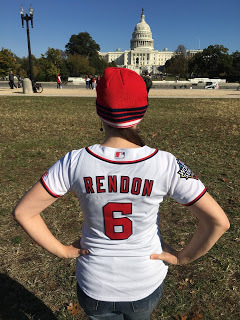 The vacant lot in my sightline used to be Southeastern University, founded in 1879. A little further over was once 4 ½ Street SW; Myra Sklarew, my teacher at American University, wrote of her grandfather posing for a photo outside his home there back in 1913. The Titanic memorial hovers at the corner where Fort McNair meets with Southwest Waterfront Park, forever mourning those lost at sea in 1912. To live in this neighborhood is to box with one’s ghosts. My dad drove us along Hains Point to see The Awakening clawing out of the ground, back before they moved the sculpture to National Harbor. My Grandma Beasley gathered us for the Thanksgiving buffet at Phillips Seafood. My Grandma Pruett hummed along to the melodies of Arena Stage’s musicals. Here is where 22-year-old me roamed the Environmental Protection Agency building, destined for demolition and taken over in the meantime by Art-O-Matic in 2002.
The vacant lot in my sightline used to be Southeastern University, founded in 1879. A little further over was once 4 ½ Street SW; Myra Sklarew, my teacher at American University, wrote of her grandfather posing for a photo outside his home there back in 1913. The Titanic memorial hovers at the corner where Fort McNair meets with Southwest Waterfront Park, forever mourning those lost at sea in 1912. To live in this neighborhood is to box with one’s ghosts. My dad drove us along Hains Point to see The Awakening clawing out of the ground, back before they moved the sculpture to National Harbor. My Grandma Beasley gathered us for the Thanksgiving buffet at Phillips Seafood. My Grandma Pruett hummed along to the melodies of Arena Stage’s musicals. Here is where 22-year-old me roamed the Environmental Protection Agency building, destined for demolition and taken over in the meantime by Art-O-Matic in 2002.
My first Southwest address was a building designed by I. M. Pei, and the second a complex by Chloethiel Woodard Smith. Both were key figures in the 1960s urban renewal movement that turned this neighborhood into a Brutalist toy-box of beautiful and, today, dilapidated forms. Their buildings also displaced thousands who couldn’t afford the new reality.
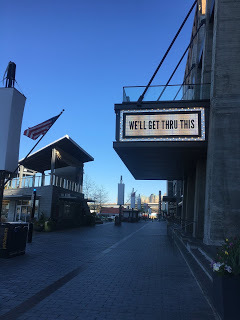 Sometimes when describing Southwest Waterfront, the other person interrupts—Oh, you
Sometimes when describing Southwest Waterfront, the other person interrupts—Oh, you mean the Wharf?—and I wince, caught between waves of gentrification. The pandemic has complicated my feelings toward this multi-million dollar behemoth. Restaurants where I couldn’t afford to a sit-down meal converted their pantries to bodegas that sold chicken, carrots, onions, and greens. The fancy liquor store distributed locally distilled sanitizer. When I first read The Anthem’s sign, “We’ll Get Thru This,” my immediate thought was: Okay then. We will. I needed to have someone say it. I needed for someone to spell it out in foot-tall letters.
Still, the city’s ghosts pull no punches. This past April, when it didn’t feel safe to go out, I could step out on the balcony and see cherry trees blossoming along East Potomac Park. I took great comfort in that. Now Washington Channel is disappearing, floor by concrete floor. Fifty years after our own building went up, I understand the irony of complaining about new construction or rising rent. I can still glimpse the water, if I stand in the right spot.
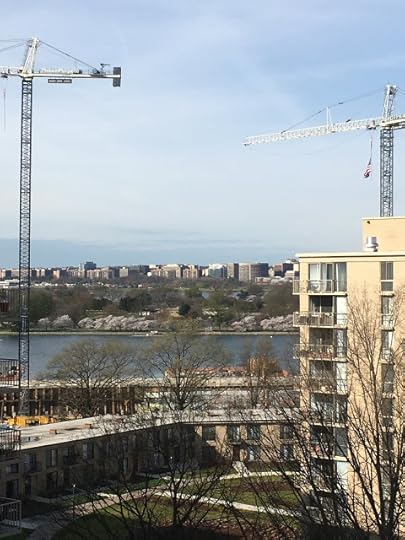
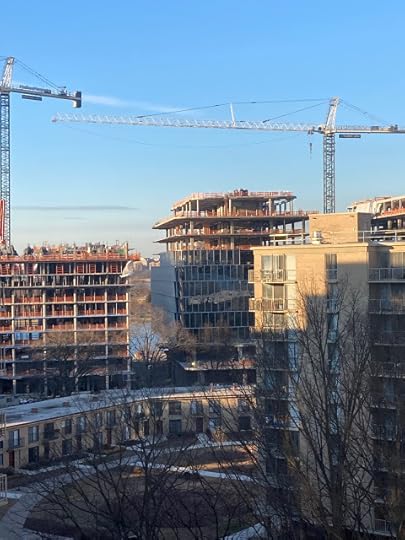
In just a few weeks, Made to Explode, will be published with W. W. Norton. The collection (my fourth!) has a whole section of prose poems that interrogate the strangeness of our monuments and memorials, our "living history, plus a sestina called "American Rome." There are lots of things that I am unsure of, but one thing I do know is that DC is the right place to be as this book enters the world. I'm particularly excited that Politics & Prose is using it as the February pick for their Signed First Editions Book Club, because that will put the book into the hands of some Washingtonians who may not usually reach for poetry.
Vienna is where my family is. Hyattsville is more affordable. Yet this neighborhood holds me, this peculiar cauldron of personal memory and cultural history just blocks from the National Mall. Maybe I won’t ever get to be a Washingtonian; maybe that was decided the moment I was born at Inova Fairfax Hospital. But I am here now. I choose DC for the view. Not a literal vantage point, or one particular set of windows, but because I am invested in what has been and what might be to come.
December 27, 2020
2020
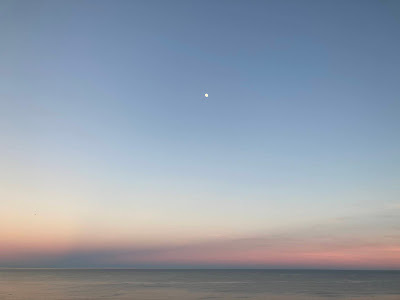
I've grieved this year. I know you have too. I lost a dear mentor. The program in which I taught closed down. I came close to getting a dream job--but did not. Another opportunity required weeks of fraught negotiation. My city's streets were invaded, helicopters a constant presence overhead. Tyrannical subversion of the law has felt like a very real possibility at every turn. A pandemic has attacked friends, family, whole communities, killed thousands, and shut down local institutions that long anchored my understanding of what it meant to live as a writer in DC. Last night, as I opened my laptop and first sat down to write this blog post, brought the news that musician Tony Rice, who shaped my understanding of bluegrass, passed away on Christmas day.
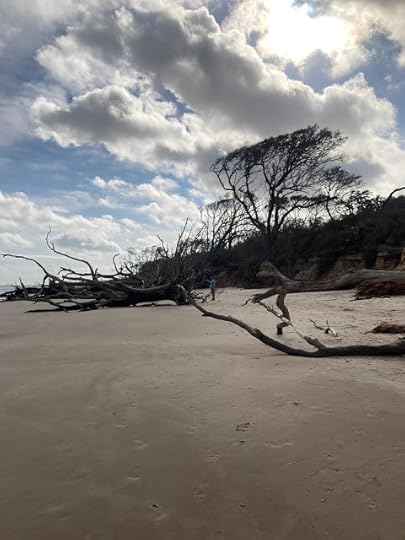
I'm grateful to all the writer-friends who have stayed active on social media, who have given us dialogue beyond the latest doom-scrolling (a word I did not need before 2020); I simply found it difficult to be one of them. If you're seeing this it means you didn't give up on the possibility of my posting here. I'm grateful for that, too.
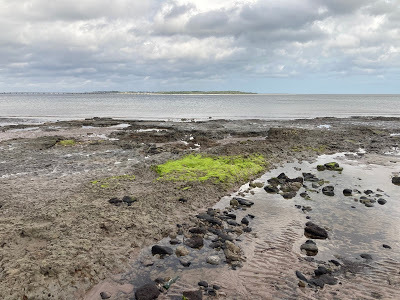
There were beautiful moments of this year. Friends had babies. My sister got married. We brought home Sal the Wonder Cat. My husband and I worked through sharing a small space day in, day out. Made to Explode got its cover. I can't be glib about silver linings, but I can recognize the planting of seeds that will bloom. I'll see you in 2021.
